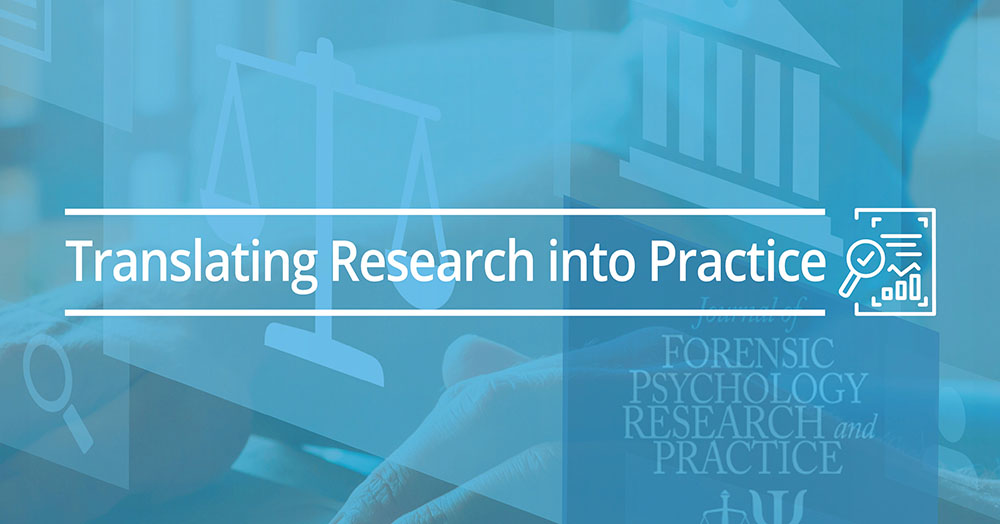Article Title
Educational Needs among Women Admitted to High Secure Forensic Psychiatric Care | 2022, Vol. 22, No. 3, 269-284
Authors
Heidi Selenius; Department of Special Education, Stockholm University, Stockholm, Sweden; Department of Psychology, Linneaus University, Vaxjo, Sweden
Linda Faith; Department of Pedagogy and Learning, Linneaus University, Vaxjo, Sweden
Idor Svensson; Department of Psychology, Linneaus University, Vaxjo, Sweden
Susanne Strand; Centre for Violence Studies, School of Law, Psychological and Social Work, Orebro University, Orebro, Sweden; Centre for Forensic Behavioural Science, Swinburne University of Technology, Melbourne, Australia
Abstract
Forensic psychiatric patients’ low educational attainment is a strong predictor for recidivism. However, there is a lack of studies on the educational background among women admitted to forensic psychiatric care. The study aimed to investigate the educational background among women within a high secure forensic psychiatric setting. A mixed-method design was applied. Data were collected from registers, including medical records, forensic psychiatric investigations, and verdicts (n = 93), and by conducting interviews (n = 61) with women admitted to forensic psychiatric care in Sweden. The women’s education length varied between 5 and 18 years. According to interviews and registers, more than 70% of the women were found to have some school-related problems. In the interviews, some women associated school with conflicts, loneliness, and learning difficulties. Others explained how their disadvantageous home environment and many school changes affected their learning and problems developing and maintaining social relationships. Women with a neurodevelopmental disorder were to a higher degree documented with school-related problems than women without such disorders (97% vs. 63%). The educational attainment varied among the women, and consequently, their educational needs were heterogeneous. Therefore, they should be offered tailored education and vocational support to have an increased prerequisite for adjusting to and participating in society.
Keywords
Forensic psychiatry; women; education; neurodevelopmental disorders
Summary of the Research
“Forensic psychiatric care in Sweden is responsible for patients with multi-faceted needs…International research reveals that the most complex needs are found among forensic psychiatric patients with intellectual disabilities and mental health problems…The level of education is generally low among forensic psychiatric patients…Offenders who lack education and/or employment have criminogenic needs, regarded as risk factors for future criminality…Low educational attainment among offenders admitted to forensic psychiatric care in Sweden has also been reported to be one of the strongest predictors for relapse in general as well as to violent crimes…In general, there is a lack of studies on educational needs in forensic psychiatric patients. Furthermore, to our knowledge, there is not a single study investigating in depth the educational background among women admitted to forensic psychiatric care…with the purpose of being able to meet the educational needs of women admitted to forensic psychiatric care, the current study aimed to investigate the educational background among women within a high secure forensic psychiatric setting…” (p. 270-271).
“…The present study consisted of women admitted to inpatient care within two high secure forensic psychiatric hospitals in Sweden…Results from both register data and interviews show experiences of learning difficulties, behavioral problems, and exposure to bullying…76% had at least some type of school-related problem, and 39% were diagnosed with a neurodevelopmental disorder…However, in the interviews, some women described a good educational background and had only experienced some trouble with social relations in school…Despite school being a safe environment for some women, it did not help them gain the necessary educational skills…” (p. 272-278).
“One of the main results from the present study is that women with neurodevelopmental disorders were characterized by more school-related problems than those without such a disorder…The clinical picture of neurodevelopmental disorders may vary from forensic psychiatric patient to another, particularly women with autism spectrum disorders…Therefore, potential comorbidity between neurodevelopmental disorders should be identified in order to identify appropriate treatments and interventions for these women…During the interviews, 47% of the women mentioned reading and writing difficulties, whereas, in the register study, 10% of the women were noted as having such difficulties. None of the women in the register study had been diagnosed with dyslexia or reading and writing disabilities…Our results show that it is essential to ask questions about how it was in school and how women perceive their ability to read and write to avoid lost basic information in forensic psychiatric care…” (p. 280).
Translating Research into Practice
“The results from the present study also show that educational attainment and school experiences vary, and consequently, the educational needs of the women admitted to forensic psychiatric care. Some previous studies have highlighted the need for tailored educational and vocational support for forensic psychiatric patients (Harris et al., 2020; Samele et al., 2018), supported by the present study results. Because women admitted to forensic psychiatric care were characterized by severe mental disorders and multifaceted difficulties in previous education, they probably need teachers with special educational competence. Such teachers are educated for adjusting instructions and tailoring educational interventions, and they might be able to provide the female patients with prerequisites to cope with education and vocational training” (p. 279).
“…[prior researchers have] emphasized the importance of assessing forensic psychiatric patients for autism spectrum disorder to avoid misunderstandings and respond appropriately. Subsequently, special educational support may be required when the teacher meets the patients and plans and organizes the teaching to suit each patient’s needs for entering education and employment. For example, there are pedagogical strategies such as providing activities that support impaired executive functions…The education of persons with learning problems needs to be based on general principles such as being explicit, individualized, comprehensive, and contain differentiated instructions with adjusted intensity…The women admitted to forensic psychiatric care should be provided education by teachers whom they can trust. In this way, they receive personal support to break negative patterns of school failure, feelings of loneliness, and exclusion at school. The women with school-related problems and low educational attainment might need emotional support to dare to start an education or handle a school assignment after repeated school failures and poor social relations at school…” (p. 279-280).
“…forensic psychiatric patients are characterized by a double burden when entering the labor market. They must handle both the stigma of severe mental health problems and being convicted of a severe offense. The present study results also express that they may carry an additional burden due to low educational attainment. Subsequently, it is vital to identify and evaluate interventions that break further marginalization…there is, to our knowledge, only one study on improving reading ability (Svensson et al., 2017). According to Swedish authorities, there are also trials of teaching forensic psychiatric patients to make personal budgets…Undoubtedly there is a great need for further studies investigating the educational needs of women admitted to forensic psychiatric care and scientifically evaluated different types of educational support and interventions…” (p. 281).
Other Interesting Tidbits for Researchers and Clinicians
“Studies indicate that forensic psychiatric patients may have had learning difficulties in school as a high proportion of patients lack functional reading skills…Such reading skills are required to cope with reading in everyday life, and patients lacking such skills have probably had challenges with different school assignments based on reading and writing. Without functional reading skills, the patients will also struggle with assimilating care plans and timetables…Women with poor reading skills within forensic psychiatric care also perceive themselves as low school performers…Moreover, neurodevelopmental disorders such as ADHD [attention deficit hyperactivity disorder], autism spectrum disorders, specific learning disorders, and intellectual disability…have also been shown to be prevalent among forensic psychiatric patients…Neurodevelopmental disorders are generally associated with school difficulties…and low educational attainment compared to peers without such disorders…” (p. 270-271).
Additional Resources/Programs
Join the Discussion
As always, please join the discussion below if you have thoughts or comments to add!























